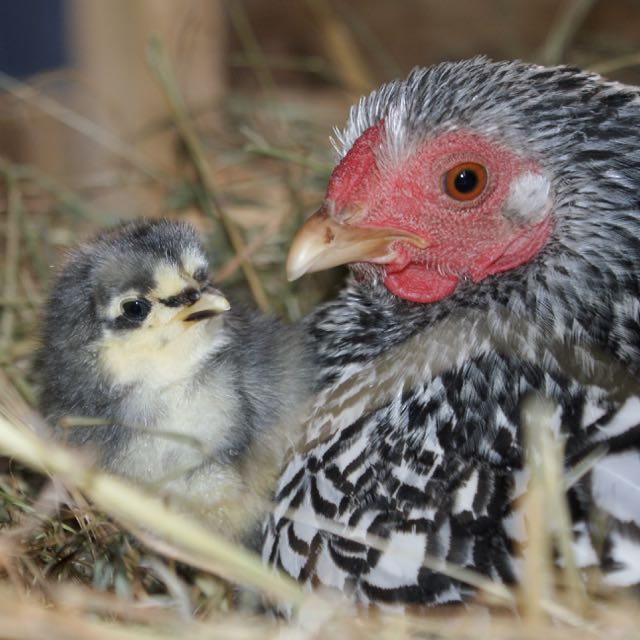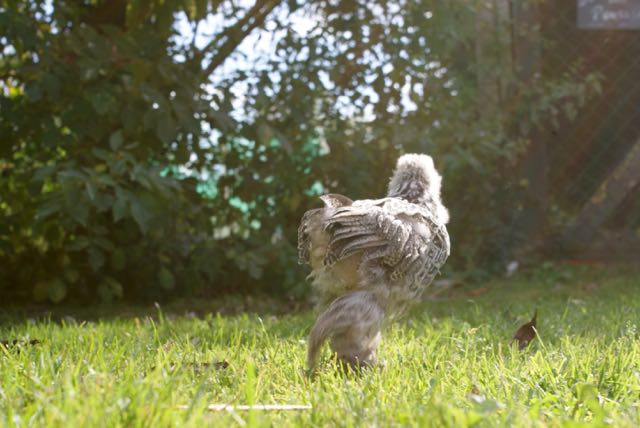I’ve recently offered to answer all the questions asked about a video filmed in spring here in brahmaland
Here are the answers to your questions 🙂
What type of bedding do you use in the chicken coops and what thickness ?
We use dust-free wood shavings and shredded linseed straw. We mix the two to obtain a very hygienic bedding, the linseed straw absorbs liquids very well and wood shavings give volume to it all.
When the bedding has just been put into place, it’s about 5-7cm thick wether it’s for a brooder hen or just chicken coop bedding.
What type of chicken is bred in Brahmaland (broiler or laying hens) ?
We mainly breed (97%) ornemental and ‘pet’ chickens but we also have a few commercial breeds (egg production). We cross them with brahma roosters and we get very good laying hens with a bit more volume and size. We do not want to produce laying x broiler chicken hybrids, the industry make enough of those !!
How many chickens do you have on site ?
The number of chickens depend on the time of year. We usually keep between 150 and 200 chickens in Brahmaland.
Every subject is identified right after hatching and they’re all given names like any other animal here.
How are you able to prevent unwanted cross-breeding ?
Every family is made to last. We don’t play around with the roosters, changing them from time to time like many breeders do. When a family is established, we respect it and the rooster unites and federates his hens. Every group (or family) has it’s own closed chicken run. We set them free one group at a time when the roosters are able to manage their family properly.
Sometimes a hen can get lost or go over a fence but it’s a very rare incident when family groups are steady. If this happens, eggs aren’t sold for 20 days. If they are, we tell you who the parents are and what the chicks should look like. 🙂
Building our chicken coops
We use wooden fruit storage boxes (Palox) that we buy second-hand in orchards. Then we fit them to our needs as follows :
- Add a rooftop that can easily open to have an easy access to the inside (cleaning, collecting eggs, etc…)
- Create an opening on one side, like a door to let the chickens in.
- We add a footbridge leading to the door, size dependent on the breed of chicken it’s made for.
- Cut a piece of tarpaulin that you fit on the bottom to make cleaning easier.
- Fix a tarpaulin on the rooftop and on the sides exposed to high winds and rain.
No roosts or laying nests to prevent red mite invasions 🙂
When we need nests for our brooding hens, we use plastic basins, easy to clean or disposable cardboard boxes that we can throw away if any parasites appear !
Team Brahmaland !
We are now 5 helping out and making sure Brahmaland is a success :
- Gaëlle (myself !) Business owner who tries do take care of everything 🙂 :
- Chicken farming management with everything that implies : maintenance, care, cleaning, collecting eggs, etc…
- Website management, Facebook pages, youtube channels, etc.
- Dealing with incoming orders, parcel preparation, dispatching, etc.
- Answering all the messages and mails received daily !!
- Managing the incubation and hatching, fertility tests, egg inventory, etc.
- seconded by JF (my spouse)
- Maintains the green spaces clean and tidy, mows the lawn, etc.
- Helps me out with most of my daily tasks and chores, seconds me when special care is needed.
- P’Ang, our scholar chick, who helps me out with my administrative work and posts articles on the blog 🙂
- Diane, student, who gives me a hand on her days off :
- Chicken runs and coops maintenance, etc.
- Supervises daily chicken outings, care.
- Getting parcels ready to be sent out
- Writes articles for the internet
- Camille, my partner who supports me on a crazy project, translating my french blog to allow english speaking people to be part of the adventure !
And of course, my feathery team, everything would be impossible without them !! 🙂
Is there a way for you to take some time off from your chicken farm and be replaced by someone else ?
We’ve already tries on several occasions but it’s very difficult because chickens are sensitive beings who do not like change. They have their habits and in order for everything to go well we need to find someone they already know and is used to our way of caring for them, feeding them. 🙂
Again, this is a small scale business, the most important thing for us is animal welfare wich guarantees you a good quality production 🙂
But there are other tasks that can be taught easily to someone else and that don’t necessarily involve the animals. 🙂
Why clean the eggs ?
First of all, I don’t want to send dirty eggs. I know other people do it but I think it’s a lack of respect for the person who ordered the products. It’s my personal opinion. 🙂
We follow a strict egg-cleaning process to prevent bacteria, virus, fungal diseases and other things from spreading.
After collecting the eggs, they are cleaned and brushed in a antibacterial, anti-virus and anti-fungal solution. This process takes way the varnish present on the surface of the egg-shell. When the egg is laid, it falls onto the bedding and even if its cleaned regularly, it’s still full of germs. When the varnish dries up, it imprisons a whole lot of germs on the egg shell.
You can une diluted bleach for example or any other wide spectrum disinfectant.
Why are the eggs soaked before shipment ?
After cleaning the eggs, they are stored. All the eggs that are to be shipped are soaked before they are wrapped up for protection. A strict hygiene protocol is applied in order to send perfectly clean and healthy eggs.
To sum it up : If my hands are dirty and I touch the eggs after they have soaked, there’s no point in soaking the eggs ! 🙂
Following the dilution instructions is important depending on the solution you are using. To ensure maximum effectiveness, our eggs soak for a minimum of 15 minutes.
We use a medical disinfectant used in operating rooms. The protocol was decided by a ‘poultry expert’ biologist. I will not divulge his name or the name of the solution.
What are the difficult parts of this job ?
That’s a good question !!
Like any other job with live animals involved there are a number of environmental and time requirements : they eat everyday and all year long. They can be ill or wounded and that means a lot of caring to do as well as very upsetting moments as they are working partners and not just egg-producing animals.
The weather has a major role to play on the chores that have to be done :
- It’s hard when the rain doesn’t stop but you have to get on with your daily tasks, feeding, etc.
- When it’s very hot and temperatures rise above 30°C/86°F you have to water the chicken runs, make sure they have some shade, etc.
- In the winter, when it’s freezing, you have to check the waterers many times a day.
It’s a multi-tasking job, you get to spend time indoors and outdoors, no time to get bored ! I suffer from several different disabilities (that why I changed job !) and it enables me to change position and task in order to reduce the pain. 🙂
The real problem is to be able to earn a decent wage (that’s not the case yet), in regard to the amount of work done. We managed to meet the first target, the business is self sufficient and has been for 2 years now. All of this is achieved keeping in mind that the most important thing is the wellbeing of all my animals and always keeping up a high-quality production.
This year we have faced a terrible challenge, wildlife predation. Because of it, we haven’t been able to let our chickens out as we used to. It’s a difficult subject and we are still looking for the right solutions in agreement with our way of breeding (for instance, we do not wish to keep our animals locked-up). It’s the biggest challenge of 2017 and it questions the future of Brahmaland.
—–
Done ! The Q & A mission is accomplished !
I hope these answers will satisfy all my nosey readers ! 🙂
2


